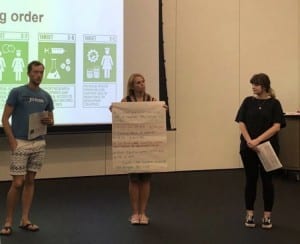PhD student Laura Simmons attended the Doctoral Training Alliance Biosciences for Health summer school hosted by the University of Huddersfield on the 24th-26th July. During the 3-day event students took part in a variety of workshops that focused on how individuals can make an impact with their research.
 The main focus of the summer school was the Impact Challenge where students had to present a pitch to a group of judges on a particular research topic. We were encouraged to choose a goal, define the outcomes, outputs and funding requirements. This provided a great opportunity for students to consider how much funding would be required and what resources would be needed to carry out the project. We were also encouraged to consider our connections to external charities and organisations that could help us in achieving the project goals.
The main focus of the summer school was the Impact Challenge where students had to present a pitch to a group of judges on a particular research topic. We were encouraged to choose a goal, define the outcomes, outputs and funding requirements. This provided a great opportunity for students to consider how much funding would be required and what resources would be needed to carry out the project. We were also encouraged to consider our connections to external charities and organisations that could help us in achieving the project goals.
There were a variety of projects that were presented during the summer school including: a uterus massage to reduce haemorrhaging and maternal mortality (Laura Simmons); a diabetes mobile app to reduce mortality from non-communicable diseases and promote health (Sophie Mohamed); and implementing an online training course to empower healthcare workforces in developing countries (Ksenia Trischel).
 Laura and her team were one of three groups who were awarded ‘funding’ from the judging panel (awarded in chocolate coins) for their work on developing an educational programme to reduce haemorrhaging during childbirth to reduce maternal mortality.
Laura and her team were one of three groups who were awarded ‘funding’ from the judging panel (awarded in chocolate coins) for their work on developing an educational programme to reduce haemorrhaging during childbirth to reduce maternal mortality.
Overall the Impact Challenge was a useful exercise that mirrored the real life expectations of working with colleagues to produce a funding application. It challenged us to think outside the box and consider the impact that the project may have from other perspectives such as the economy.
For more information about the Doctoral Training Alliance visit their website https://unialliance.ac.uk/dta/programmes/dta-applied-biosciences-for-health
By Laura Simmons











